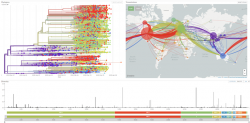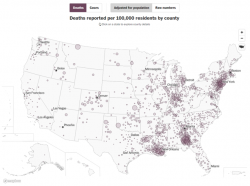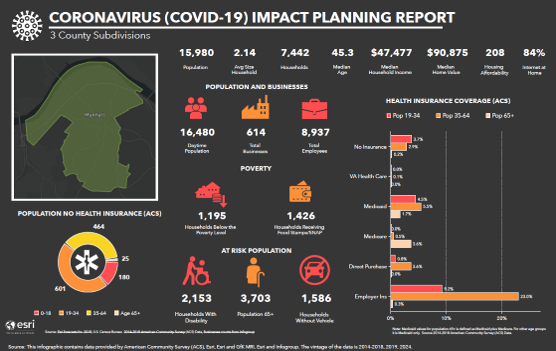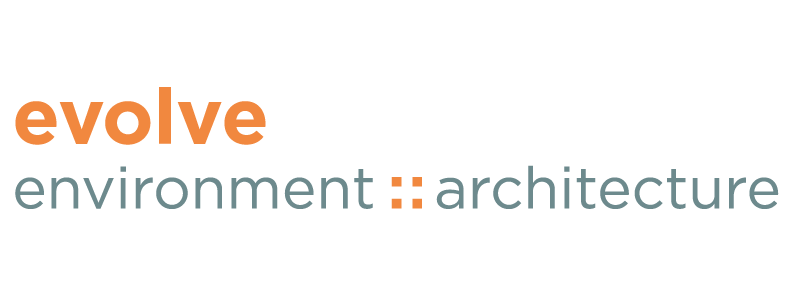Good Data Leads to Good Decisions: The Value of Data in a Time of Crisis
During this unprecedented time, evolveEA has been collaborating with our clients to determine effective, data-driven approaches that will equitably support our communities. While our clients, both municipal and professional, have a history of emergency planning and event response, the current crisis raises the need for timely, accurate, and informative data to craft effective and agile responses. Recent articles by the Brookings Institute and the New York Times demonstrate that data, and access to data, can lessen the impact of the COVID crisis by connecting us to those in need and can make us aware of how COVID is affecting our neighbors in unequal ways. We have seen this ring true in our work, too.
How Data Can Be of Service
To provide meaningful support to our communities, we should ask three main questions:
- Who is most significantly impacted? What groups are experiencing disruption/destabilization due to the current crisis? How do we identify them?
- How are people impacted? What are the primary impacts of COVID-19 and Stay-Home Orders and do these COVID-19 impacts compound pre-existing challenges?
- What resources do people need? What support would minimize or eliminate hardships and/or allow us to adapt?
Navigating the Numbers
 We are in an age flooded with data, including a lot of COVID-related data, such as MapBox’s list of Notable Visualizations, COVID Tracking Project Datasets, and 1Point3Acres’ Repositor. It can be challenging to sort out what is most relevant to our own organizations and the communities we serve. The data we find through news sources or federal agencies can be too general and local data can be difficult to find as it is rarely centrally managed.
We are in an age flooded with data, including a lot of COVID-related data, such as MapBox’s list of Notable Visualizations, COVID Tracking Project Datasets, and 1Point3Acres’ Repositor. It can be challenging to sort out what is most relevant to our own organizations and the communities we serve. The data we find through news sources or federal agencies can be too general and local data can be difficult to find as it is rarely centrally managed.

For example, you could easily find data on hospital bed occupancy, COVID case counts, and unemployment from a range of sources like the CDC, John Hopkins, or news outlets like the New York Times or Washington Post. Although useful in understanding regional trends, these sources do not provide much guidance for local groups interested in addressing current hospitalizations, or social distancing in their communities.
Local information can come through regional sources like Allegheny County Analytics and their QuickCount Data Interface, or one can specifically aggregate topical information from the American Community Survey like in this Covid Vulnerability Dashboard generated by ESRI Business Analyst. Unfortunately, the algorithms that aggregate data points into dashboard statistics can be challenging to act upon, as it can be hard to compare and contrast information across multiple topics.

COVID infographic made using ESRI Business Analyst
Local Matters
For point in time decisions, researchers ideally have access to primary cross-sectional data that is gathered through local community surveys. This type of data is more robust than the alternative generalist, aggregated, or secondary data that is more commonly available (explore a real-world case study). When a community-oriented agency, institution, department, or organization conducts its own data collection, the product can better describe the nuances of their community issues and can lead to better outcomes.
A local example of a primary cross-sectional survey is the Millvale Community Needs Assessment (CNA). This survey was performed by the Millvale Community Library in 2017 to better understand the residents of Millvale, so that the Library, Borough, and their partners can better serve them. After extensive outreach, the Library achieved a sample population of approximately 22%, which is high compared to the census’ sample size of approximately 16.5% of households or the American Community Survey (ACS) that samples approximately 2% of households every year (Source). The CNA survey asked questions related to housing, employment, household needs, safety, children and young adults, for those living in Millvale.
To delve into more details about the Millvale CNA and how data was used, continue your journey here.
Contributing Authors: Nico Azel


